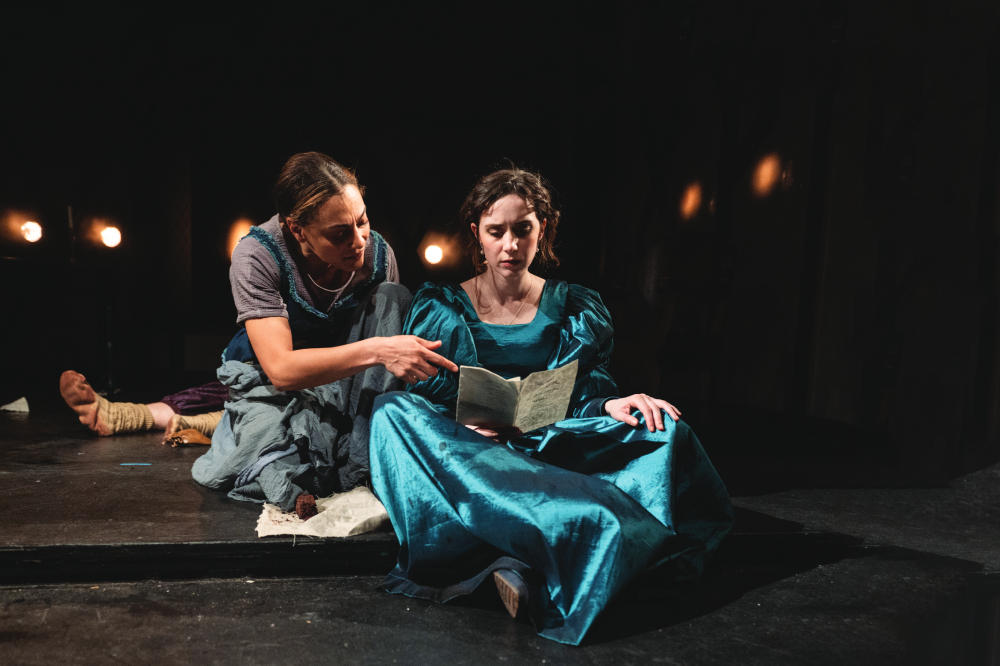Culture
 Amelia Workman + Talene Monahon in Jane Anger. Photo by Valerie Terranova.
Amelia Workman + Talene Monahon in Jane Anger. Photo by Valerie Terranova.
A Feminist Revenge Farce: Shakespeare Theatre Company presents “Jane Anger”
December 1, 2022 @ 12:00pm
Set to play at Shakespeare Theatre Company’s Michael R. Klein Theatre from December 13 to January 8, “Jane Anger,” tells the story of Shakespeare and his assistant Francis attempting to create during the plague. There was a period during our own pandemic where people threw around tweets and memes reading, “Shakespeare wrote ‘King Lear’ during the plague.” They asked what next great work would be born out of our quarantine — an idea that “Jane Anger” playwright Talene Monahon both criticized and emulated.
“What a weird, capitalistic response to this traumatic event,” Monahon says. “But then I wondered what that plague was even like. As I started doing research, I started experimenting in this farce world, because what came out was very silly writing.”
In “Jane Anger,” Shakespeare has writer’s block while in quarantine until Jane Anger climbs through his window, ready to bring her ideas to the page. Along with Shakespeare’s wife, Anne Hathaway, the two women start making real strides in writing.
Anger is a real person Monahon found in her early research. Author of “Jane Anger: Her Protection for Women,” published in 1589, Anger was one of the first of her time to write against male supremacy, especially critiquing the male gaze in literature.
“She should already be in the common lexicon,” Amelia Workman, the actress who plays Anger, says. “We should all have an idea of this woman. And being able to imprint myself on that is really fun.”
Since little is known about Anger besides her published work, Monahon merged her character with the Dark Lady who appears in many Shakespeare sonnets. The two women create a force: voices previously silenced by racism and sexism now brought centerstage.
“I don’t get a lot of personal narratives or representations of people who look like me from many periods of history,” Workman says. “But smart, working-class people have always existed. A lot of great people don’t get written about in books, so we don’t know about them.”
“A theme in all my plays is a preoccupation with history — these other galaxies of histories that exist,” Monahon says. “Just really thinking about what’s getting buried or forgotten in history.”
While the play’s premise is based on historical figures, Monahon and Workman were quick to remind it’s a farce: a comedic, fictional story involving characters left out of our accepted history. In fact, the play is a mashup of genres. In her research, Monahon read a few revenge tragedies, plays like “Titus Andronicus” that are incredibly bloody, where characters die in ridiculous ways. She wondered what the genre would look like with a little comedy mixed in.
“I call it a feminist revenge farce,” Monahon says. “It’s really goofy — 90 minutes of a silly night at the theater.”
The actors and actresses involved in the play have worked together since earlier performances in New York City. Monahon and Workman act alongside Michael Urie as William Shakespeare and Ryan Spahn as Francis, and together, they embody the humanness of historical figures we place on pedestals.
“Shakespeare is protected in his ivory tower,” Workman says. “So, the play is irreverent simply because it just treats him as a normal person. Michael is so lovable as Shakespeare even when he’s being a butthead. I think you can love him and still see the problems with what’s happening.”
The play answers real-life Anger’s work in that way, creating well-rounded characters no matter the gender or race. Shakespeare was a genius and he also had to bathe. Hathaway was supportive of her husband’s writing endeavors and also sought to write her own plays.
In its own farcical way, Workman says “Jane Anger” asks, “How do you hold all of what a person is?”
The play doesn’t go as far as iambic pentameter, but Monahon and Workman assure there are plenty of Shakespeare Easter eggs peppered throughout. Audience members will recognize the essence of Shakespeare, but they don’t need to be Shakespeare scholars to fully enjoy this different perspective of the time.
Monahon shared a quote by Hilary Mantel that inspires her work: “History is not the past. It is the method we’ve evolved of organizing our ignorance of the past.”
In its own new, genre-bending, comedic way, “Jane Anger” deals with this idea: that history is slippery and people even more so. Our accepted history shows Shakespeare alone, or surrounded by other male playwrights of the time, gathered around a script. But there were always other people in the peripheries — and “Jane Anger” shows us what happens when they take a seat at the table.
Shakespeare Theatre Company’s Michael R. Klein Theatre: 450 7th St. NW, DC; 202-547-1122; shakespearetheatre.org // @shakespeareindc







